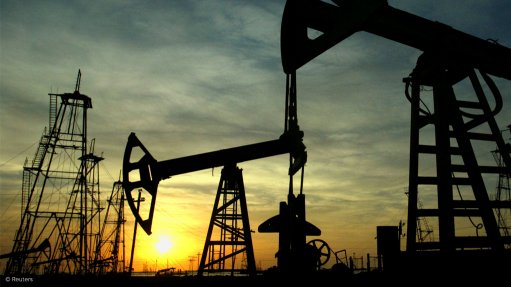
OILY CHALLENGES
Owing to external issues, such as global market decline, some African oil-producing countries are facing increased challenges
Photo by: Reuters
Several major international independent power producers and power generation developers are interested in South Africa’s gas-to-power programme (GPP), for which direction in the form of request for quotations and request for proposals from the Department of Energy (DoE) is keenly awaited.
However, developers may focus their attention on other parts of Africa or other parts of the world where similar opportunities exist if South Africa does not speed up the development of its gas economy, says engineering consultant WSP power generation director Wayne Lindecke.
He points out that many African countries are still heavily reliant on resource-based trade, either through investments, development, job creation or driving growth in supporting sectors.
Countries, such as Nigeria, have faced difficulties, owing to outside market problems, such as decreased growth in China, whereas other oil- and gas-producing countries, such as Mozambique, Tanzania and Uganda, have continued to grow.
“They are still benefiting from investment and growth in their economies, and developments linked to their oil and gas industries, which have been less affected by global market influences . . . policymakers in these countries have been very clear about their intentions to export sizeable amounts of natural gas,” Lindecke explains.
Local Challenges
Lindecke highlights that the South African gas industry is facing challenges regarding the DoE not updating the Integrated Resource Plan (IRP), nor further developing the Gas Utilisation Master Plan (GUMP), both subsequently delaying the implementation of the GPP.
Further challenges involve government creating uncertainty with regard to its priorities in the implementation of the various resource-linked programmes that have been initiated by the DoE to diversify South Africa’s energy mix. He states that the implementation of the GPP is crucial to further develop associated industries and establish a local gas economy.
“In South Africa, we are facing a funding gap that is required to meet the financial requirements of projects under development and under construction. It’s for this reason that the DoE has been active in engaging with the oil and gas industry, discussing procurement and public–private partnership models across the three tiers (coal, gas and nuclear) of potential baseload power,” Lindecke points out.
The country is further dealing with the regressive growth of its economy over the past two years, with ratings agency Fitch Ratings downgrading South Africa to junk status in April last year. “This makes sourcing outside funding for large-scale projects more difficult,” he notes.
Lindecke says finding financing for projects in the oil and gas industry is, however, not a challenge that is unique to South Africa. Owing to the global market slowing down with oil and gas consumption in some first world countries decreasing, African oil and gas producing countries are also facing challenges.
“We have already seen a slowdown in projects, owing to the availability of funding, and, as a result, emerging economies are increasingly turning to sovereign funding to finance their large-scale infrastructure projects.”
Developing Projects
Lindecke points out that developments in gas-to-power still offer immense opportunities. However, a clear vision and plan are essential to ensure the development of the necessary infrastructure such as ports, pipelines and liquefied natural gas facilities.
“. . . not to mention secondary infrastructure development to support adequately monetising reserves and unlocking the full potential offered to bolster development across Africa,” he adds.
African countries have unique requirements that have to be adequately addressed in terms of their localisation and environmental agendas. For long-term planning to be successful, countries need to look beyond the immediate sector and consider the resultant growth implications for other related downstream industries.
The challenge, Lindecke highlights, is ensuring an optimal balance between attracting the necessary investment and technical capabilities needed to get a prospective gas plant off the ground, but without stifling private-sector interest.
South Africa urgently needs to set a regulatory framework that identifies its key resources and lays the foundation for the necessary investment in infrastructure, he emphasises.
“Only then will the country be able to monetise natural gas and use it as a key driver for promoting growth and economic development. For instance, if we look at the IRP – knowing that it needs to be updated – we are supposed to have the first gas-to-power plant completed by 2019.”
He points out that, should the GUMP be delayed any further, this target date will be missed.